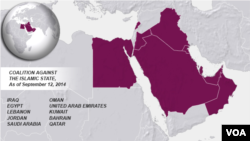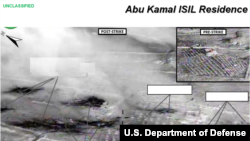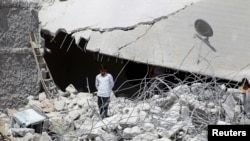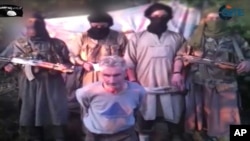The United States counted five Arab allies when it began airstrikes against the so-called Islamic State group in Syria, supporting President Barack Obama’s argument that the militants must be dealt with by a regional and global coalition.
Experts say the barbaric actions of the group may be doing as much as President Obama’s appeal to expand the anti-IS coalition.
Targets in eastern Syria included command and control centers, training facilities, oil refineries and vehicles. Pentagon officials said this is the beginning of a sustained military campaign that some analysts believe may take years.
Saudi Arabia, Jordan, Bahrain and the United Arab Emirates joined the U.S. forces in the strikes while Qatar played a supporting role. President Obama said Arab participation “makes it clear to the world that this is not America’s fight alone.”
Unconventional terrorist threat
Retired Admiral James Stavridis, a former supreme allied commander at NATO and currently dean of the Fletcher School at Tufts University, said an international coalition is essential.
“This is really a challenge for civilization and that means getting contributions not only from the region, but globally,” he said.
Stavridis said IS poses a threat unlike traditional militant organizations.
“I think really the closest analog to ISIL is not a terrorist group,” he said, using one of several acronyms for IS. “It looks more to me like a pirate organization. They are reaping riches. They are selling women and children as slaves.
“They are killing indiscriminately in a terrorist kind of way," he said. "So just as pirates are something that the entire world has to stand up to, I think ISIS is more and more in that category."
President Obama said more than 40 countries have joined the anti-Islamic State coalition meant to “degrade and destroy” the group.
Call for unity
Retired Army General Jack Keane, chairman of the Institute for the Study of War and former vice-chief of the U.S. army, said President Obama must be forceful in making his case to allies for an international coalition against IS.
“When you are fighting battles like this and you are obviously in a war, that sense of urgency and aggressiveness and very strong conviction and determination is essential. It communicates throughout your force,” Keane said. “I just hope that the president of the United States is speaking with conviction and determination privately on the phone to these coalition partners, so that they truly are going to provide real military capabilities and not just moral support for public rhetoric.”
International commitments after Obama’s September 10 speech outlining a strategy to combat the Islamic State were few and far between.
But the actions of IS may have helped bring others on board. British Prime Minister David Cameron, who reacted in horror to the beheading of a Briton by the extremist group, told the U.N. Security Council he wants his country “to play its part.”
France, too, said it may expand its role and take part in strikes in Syria, hours after Algerian militants linked to the IS beheaded a French citizen.
And the momentum appears to be growing. Belgium and the Netherlands said Wednesday they will also take part in airstrikes in Iraq.
But Stavridis and Keane agree airstrikes alone will not defeat the IS and that a ground force will be needed to do the job.
“Nobody is enthusiastic about more difficult, challenging combat in the Middle East,” Stavridis said. “But the reality of the world is such that we have to stand up to these people. They are barbaric and they cannot be allowed to continue.”








